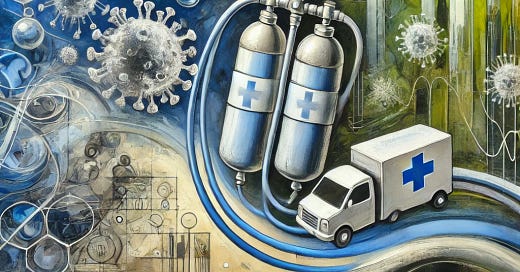Peter Sands, Direktor des Global Fund, im Economist:
Then Covid-19 struck five years ago, hundreds of thousands died because of a lack of oxygen. Even in rich countries, demand for oxygen overwhelmed hospitals in the first wave of the pandemic.
In low- and middle-income countries, where nine out of ten hospitals had no medical-oxygen capacity, desperate families went to extraordinary lengths to procure oxygen cylinders to try to save their loved ones.
In response, close to $1bn was mobilised to help these countries provide emergency supplies of cylinders and to invest in more scalable and cost-effective approaches, such as pressure swing adsorption (PSA) plants that create medical oxygen from the atmosphere.
These investments, alongside training, have constituted the biggest expansion in access to medical oxygen such countries have ever seen. In Nigeria alone, 73 hospitals now have or are on track to have PSA plants creating oxygen that is then piped to hospital beds or used to fill cylinders distributed to other health facilities.
Although the original intent was to save lives threatened by covid-19, these investments are now saving lives in other ways. Many deaths from maternal and neonatal complications, or from traffic accidents or other traumas, can be prevented if medical oxygen is available. Many life-saving surgical procedures require the gas.
Disease surveillance is another example. To track the pandemic and identify the emergence of variants such as Omicron, poorer countries secured support to expand molecular testing, wastewater surveillance and genome-sequencing networks, and to build the systems and human capacities to interpret and respond to the data. For example, by 2023 Uganda’s National Health Laboratory had established wastewater-based surveillance at four sites.
In Malawi, wastewater surveillance helped public-health officials track and ultimately halt an outbreak of wild poliovirus type 1. In Indonesia, genome sequencing played an essential role in fighting covid-19 and will be used to develop more accurate treatment to fight other diseases including tuberculosis (TB), cancer and brain diseases. In Congo, rapid molecular testing tools have played a vital role in understanding the spread of Mpox.




